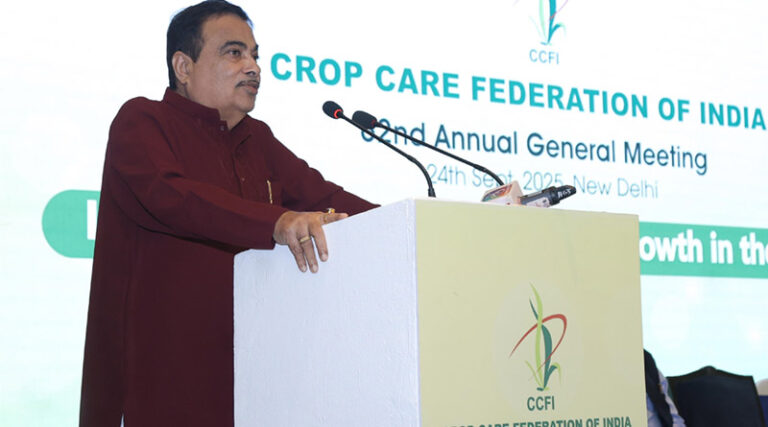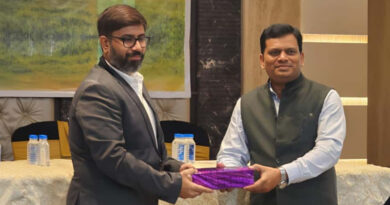
Nitin Gadkari Urges Self-Reliance in Agrochemicals at CCFI 62nd AGM in New Delhi
25 September 2025, New Delhi: The Crop Care Federation of India (CCFI) marked its 62nd Annual General Meeting (AGM) with a high-powered gathering of policymakers, industry leaders, and farmer representatives, centered on the theme “Indian Agrochemical Industry Growth in the Next Era.” The AGM was also significant for the association’s leadership elections, where Deepak Shah, Chairman of SML Limited, was re-elected as Chairman of the association, while Rajesh Aggarwal, Managing Director of Insecticides India Limited, and Ombeer Singh Tyagi, Vice President at UPL Limited, were elected as Vice Chairmen, reaffirming continuity and confidence in the team steering the association’s agenda forward.
Union Minister for Road Transport and Highways Nitin Gadkari, the chief guest, set the tone by congratulating CCFI on its long-standing role in shaping India’s agrochemical sector. He emphasized that agriculture must be a central driver of India’s journey toward self-reliance.
“India has produced more than 1,400 crore liters of ethanol from sugarcane without any issues. Today, nearly 20% of ethanol comes from corn, and the area under corn has increased by 20%. Prices have risen from ₹1,200 to ₹2,800 per quintal, far above MSP,” Gadkari noted. He highlighted how agriculture’s share in GDP—currently 18%—must rise to 26% for India to become truly aatma nirbhar.
Pointing to India’s agrochemical industry, valued at over ₹70,000 crore with 51% exports, Gadkari praised its global competitiveness but cautioned about raw material dependency. “We need to be self-reliant not just in finished goods but also in raw materials. Strengthening planting materials, nursery quality, soil health, and oilseed research is crucial if we want to reduce our massive edible oil import bill and become globally competitive,” he urged.
Shaping India’s Agricultural Future
From the Ministry of Agriculture and Farmers Welfare, P.K. Singh, Agriculture Commissioner, stressed the importance of forward-looking policies. “India has achieved food security and can even export surplus, but we must think of self-sufficiency for 2047. Crop diversification, customized agrochemicals, and moving from food security to nutritional security are essential as consumer demand shifts toward fruits, vegetables, millets, and fortified foods,” Singh said.
Industry Champions “Make in India”
Deepak Shah, Chairman of CCFI and SML Limited, welcomed the minister and outlined the scale of India’s agrochemical footprint. “With exports of over ₹40,000 crore annually and a domestic market of equal size, India contributes to food production worth $600 billion. Our products are recognized as the best in the world, and our members are driving the ‘Make in India, Make for the World’ vision,” he said.
Adding a broader perspective, Mr. R.D. Shroff, Chairman Emeritus of CCFI, highlighted the sector’s pioneering role in innovation. “Our agrochemical sector has come with the best low-cost innovations and is helping farmers around the world while maintaining global competitiveness. Indian manufacturers are investing strongly in R&D and are poised for global growth. The biggest beneficiaries are Indian farmers, who get products at the lowest possible prices. With a few supportive policy measures, agrochemical manufacturers from India can dominate global exports,” Shroff asserted.
Echoing this optimism, Rajesh Aggarwal, Vice Chairman of CCFI and MD of Insecticides India Limited, called India the “land of opportunity.” He noted, “With a young population of 70 crore, no one can stop India’s growth. Tremendous investments in R&D and manufacturing have made India a champion sector in agrochemicals. What we produce can meet both domestic needs and international demand.”
Innovation, Sustainability, and Global Challenges
The conversation also turned to future challenges and opportunities. Komal Shah Bhukhanwala, Director R&D at SML Group, underlined the urgency of sustainable solutions. “Soil health degradation and nitrate pollution from fertilizer overuse are major challenges in India and worldwide. Climate change is already causing 20% crop losses.
Consumers increasingly demand sustainable and healthier food. The next transformation in agriculture will come from biologicals, green chemistry, and innovative formulations that can reposition the agrochemical industry for the future,” she said, citing FAO estimates of $10 trillion in hidden costs imposed by current food systems.
Farmers’ Perspective
Krishna Bir Choudhary, President, Bharatiya Krishak Samaj, reminded the gathering that farmers remain at the heart of agricultural progress. “Indian agriculture has come a long way. Farmers today have access to all kinds of solutions, guided by scientists and researchers. Our domestic agrochemical industry provides the best quality at the most cost-effective rates. Even biostimulants now have a regulatory framework, which is timely for advancing sustainable agriculture,” he added.
The 62nd AGM of CCFI celebrated decades of progress but also mapped out the road ahead—one that balances productivity with sustainability, competitiveness with self-reliance, and food security with nutritional security.
As Gadkari emphasized, the agrochemical industry will be central to India’s agricultural transformation. With its strong base of innovation, export strength, and policy support, the sector is poised to play a decisive role in ensuring India’s position as a global agricultural powerhouse in the decades to come.
Also Read: Two Rows of Grapes, Two Different Futures: How Biostimulants Are Reshaping Farming
📢 If You’re in Agriculture, Make Sure the Right People Hear Your Story.
From product launches to strategic announcements, Global Agriculture offers unmatched visibility across international agri-business markets. Connect with us at pr@global-agriculture.com to explore editorial and advertising opportunities that reach the right audience, worldwide.






